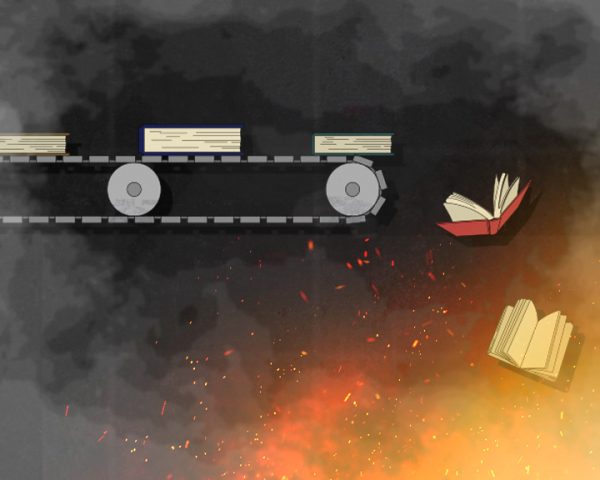.fb-comments,.fb-comments span,.fb-comments span iframe[style]{min-width:100%!important;width:100%!important}

Over the past two years, Louisiana has experienced an ongoing wave of book bans, with lawmakers and local education boards instituting policies which aim to restrict the kinds of literature accessible to students. Of the hundreds of books challenged since 2022, a majority of the targeted texts contain LGBTQ+ themes and terminology, such as mentions of non-heterosexual or transgender characters.
Book bans on their own are harmful enough. They infringe upon the right to freely access information and limit students’ personal autonomy in the academic sphere. However, there is a much deeper issue at hand with the book bans taking place in Louisiana and many other parts of the country.
Most of the books challenged or banned by the Louisiana legislature involve LGBTQ+ characters, concepts or themes — for instance, “Almost Perfect” by Brian Katcher features a transgender character and deals with themes of homophobia and transphobia. This disproportionate level of pushback against LGBTQ+ books has not gone unnoticed by opponents of the bans, who recognize it as an attempt to silence and ostracize the LGBTQ+ community.
The pushback against material like this tends to involve accusations that these books are “sexually explicit” or otherwise inappropriate for children. But the books do not involve any of the sexually explicit or pornographic content cited by those who seek to censor these books. While it might be easy to dismiss these accusations as yet more instances of moral panic directed at the LGBTQ+ community — and indeed they are such a thing — they represent a much larger issue in how the topic of queer identity is often discussed.
Far-right extremist groups like Moms for Liberty have spent years inciting moral panic about books like “Flamer” by Mike Curato for supposedly containing “sexual content,” citing the presence of so-called “alternate sexualities” — presumably referring to its gay protagonist and discussions of being closeted amid rampant homophobia.
The panic in question is rooted in a deep-seated ideology of cisheteronormativity, the misguided belief that cisgender and heterosexual people are the norm and the perception that LGBTQ+ people deviate from it. This mindset often stems from a religious attitude towards sexual orientation and gender which regard heterosexuality and cisnormativity as being of divine sexual importance.
This ecclesiastical interpretation of sexuality and gender roles often emphasize a false and outdated conflation of sex and gender, leading to the mentality of politicizing transgender bodies and sexualizing gay people — a mindset which has been popular among Republican lawmakers for years.
When the religious far right misunderstands and misrepresents LGBTQ+ identity as inherently sexual, it leads to an increase in censoring material which does so little as mention the fact that queer people exist. Ironically enough, the attempts to ban queer literature based on accusations of sexual content are rooted in an ideology which sexualizes and objectifies. LGBTQ+ people are not a threat to children — however, portraying their existence as sexual in nature does in fact pose a threat to Louisianan youth.
Conservatives fearmongering in our government and in our community has undeniably contributed to the erosion of LGBTQ+ rights in Louisiana. The fixation which many seem to have with queer bodies has led to a new wave of bills which target gender-affirming healthcare and educational resources for LGBTQ+ youth.
LGBTQ+ students deserve to learn that their identities are valid and have the right to access media which represents and humanizes them. Just as their cisgender, heterosexual classmates do not have their existence challenged and castigated, queer people have the right not to be targeted and removed from the public sphere.
LGBTQ+ students deserve not to be sexualized by people who cannot see them for anything other than their bodies or who they might love. LGBTQ+ identity is not intrinsically sexual, and our society needs to start pushing back against the objectification of queer people and the obsession with their sex lives. Just as any other person would deserve basic respect and decency, so do the queer people represented in literature.
Students are being taught to regard their queer classmates as boogeymen to be silenced. As for closeted queer students, their identity is being turned into that of a pariah that the far right seeks to remove from the public sphere altogether.
The situation is bleak, but serves as a call to action. With funding slowly being cut for libraries and books removed from shelves en masse, we need to come together and advocate for proper accountability in our school boards and library committees. We must curb book bans before literary access is cut even further, and we must hold our leaders accountable to ensure that bookshelves stay filled.
Beyond legislative measures, I believe one of the best things people can do to fight book bans is to platform censored authors and their work — be it in a webinar, a local book sale or a read-out such as those held by the American Library Association. For more information on how to do so, please see the official ALA database on banned books.
The LGBTQ+ community deserves the same degree of visibility and comfort afforded to any other human being, and the personal beliefs of religious conservatives should never take precedence over one’s right to participate and to be included in public affairs.
